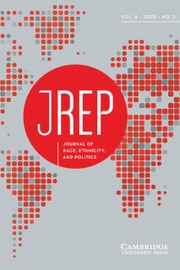Article contents
Trust, Ethnicity and Integrity in East Africa: Experimental Evidence from Kenya and Tanzania
Published online by Cambridge University Press: 13 April 2017
Abstract
Political economy comparisons of Kenya and Tanzania have often found the political salience of ethnicity to be far higher in the former than the latter, with a negative impact on intercommunal trust. This difference has tended to be explained on the basis of the different kinds of leadership that the two countries experienced after independence. However, these findings have typically been demonstrated using aggregate or survey data. This paper assesses the salience of ethnicity at the individual level for the first time, deploying monetized two-round trust games in urban Kenya and Tanzania. The experimental games isolate the comparative impact of common knowledge of ethnicity and integrity among a quasi-random selection of 486 citizens. Verifying previous findings, we observe higher levels of trust and trustworthiness in Tanzania as compared with Kenya. Further, in comparison with Kenya, any shared knowledge of ethnic identities in Tanzania leads players to transfer fewer resources, while common knowledge that both players are “honest” led to higher transfers there than in Kenya. These results provide robust evidence of higher levels of trust in Tanzania, and of the negative effect in that country of common knowledge of ethnicity on levels of cooperation. The findings demonstrate the way in which political context can shape the impact of ethnic diversity, and encourage further experimental research that looks at the intersubjective dynamics of social cooperation.
- Type
- Research Article
- Information
- Copyright
- Copyright © The Race, Ethnicity, and Politics Section of the American Political Science Association 2017
References
REFERENCES
- 1
- Cited by


